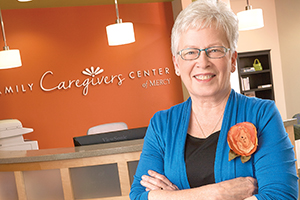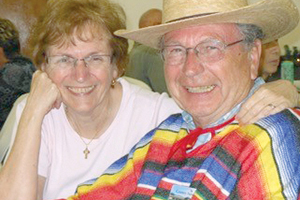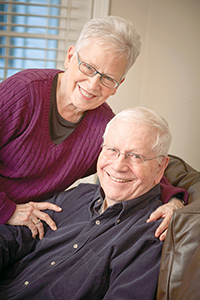Caregivers learn that to persist over the long haul, self-care is essential
By PATRICIA CORRIGAN
Being a caregiver to a loved one who is unable to care for him or herself can be an overwhelming, isolating and seemingly thankless task. The Family Caregivers Center of Mercy comes to the rescue with practical and emotional support and a one-on-one connection with volunteer coaches who can help develop a plan of care.

Carole Butz, a spiritual director whose husband has dementia, provides coaching and empathy to caregivers at the Family Caregivers Center of Mercy, part of Mercy Medical Center in Cedar Rapids, Iowa.
Courtesy of Mercy Medical Center
"Caregivers come in here upset. We give them a tour, talk to them about their needs — and their faces change," said Kathy Good, a retired social worker who directs the center on the Cedar Rapids, Iowa, campus of Mercy Medical Center. "By the time they leave, they look different. They look powerful."
Good and the other volunteers at the center recognize that caregiving is dynamic; as disease progresses and debility increases, established patterns must be adjusted. "We have learned that you have a plan, you put it in action and you pay attention. If the plan works, you keep it up," she said. "If it doesn't, you are glad you learned something and you make a new plan," Good said.
Fast out of the gate
The only comprehensive resource of its kind in east Iowa, the center opened in December 2015. Free services open to everyone regardless of a patient's hospital of choice or physician's affiliation include educational sessions, support groups, art and relaxation therapies, respite help for caregivers and help with housework or errands. The center also works with the United Way, the Heritage Area Agency on Aging, Aging Services and the Alzheimer's Association.
The delight in Good's voice is evident when she reports on the center's first year. "When we opened, we hoped to have contact with 150 people, but we served 301," she said. "We held 176 educational events, our resource library and therapy groups were up and running ahead of schedule and we also got our 24/7 Care Line operating sooner than we thought."
The financial report is equally impressive. The Mercy Medical Center Foundation's original fundraising goal for the center was $2.5 million. By April 2016, that goal had been reached and surpassed by an additional $50,000 to $100,000.
Community resource
"The center reflects what a hospital rooted in a community should be all about," said Tim Charles, Mercy Medical Center's president and chief executive. "I am especially proud that what we've done is reflective of the principle that has existed within the context of the Sisters of Mercy for decades. You look within a community and see what's needed, and hopefully from time to time you land on something unique and innovative, something that might otherwise not be offered — and you set about creating that."
Charles first met Good in 2003, at an Alzheimer's fundraising walk in Cedar Rapids. Good's husband, Dave, had the disease and she was his primary caregiver. Later, before his death, he was cared for at Mercy. In 2014, Charles asked Good to direct the new Family Caregivers Center. It's a volunteer job — only the office coordinator receives a salary.
Though Charles and Good are pleased about all the numbers that tell the story of the center's first successful year, they both know the truest measure of success lies with the caregivers who benefit from the services. In east central Iowa, there are more than 52,000 family caregivers tending to adults with chronic conditions, and an estimated 3,200 among the ailing are said to have Alzheimer's disease.
Give and receive
Dean Dennis of Cedar Rapids is one of them. When Karen Dennis' husband of 56 years was diagnosed three years ago with Alzheimer's disease, she felt overwhelmed and scared. "Suddenly my whole life was changing," she said. "Last spring, I read about the center in the hospital's magazine, and I called Kathy Good. I told her I felt so alone, so broken."

Karen and Dean Dennis
Good invited Dennis to attend "The Mindful Caregiver," a 12-week program offered at the center. "Every week when I came out of the class, I was so uplifted," Dennis said. "I learned more about the disease, and I became very proactive. Over time, my whole attitude changed. Caregiving is nothing but love, and I no longer feel intimidated by this illness."
Dennis also learned that caregivers need care. Now she makes time to walk or sit reading her Bible to regroup and has continued to take advantage of the center's offerings. "The Family Caregivers Center is an extraordinary gift to our community," she said.
Mary Robertson cares for her husband at their home in Springville, 12 miles outside Cedar Rapids. They have been married 55 years. James, who goes by "Buzz," has dementia, and they learned about the center from his doctor. "It's a very relaxed atmosphere there," she said. "You find out that other people feel like you do, and then you start to feel better."
At the center, Robertson learned she needed to make a life for herself, one apart from her role as caregiver. Sometimes she takes Buzz to an adult day care center so she can shop or go to a class at the center, and she also spends some time with female friends. "It's still very stressful sometimes, but you learn how to deal with it. I am glad Buzz is still here, home with me," she said.
Voice of experience
Carole Butz also has had personal experience caring for a loved one with dementia. In 2000, her husband, Mick, began showing signs of short-term memory loss. Seven years later, he was diagnosed with Alzheimer's. In 2012, Mick moved into residential care and now he is under hospice care. In June they will mark 50 years of marriage.

Carole and Mick Butz
While struggling with challenges posed early on by her husband's illness, Butz connected with Good, who then was in private practice in Cedar Rapids. "Kathy helped me navigate the stressful and sometimes painful waters of caregiving," Butz said. And in 2014, when Good invited Butz to join the planning team at the center, Butz was thrilled.
"My own experience felt like a good match for walking with others through the pain, grief and hard decisions that are so often a part of the caregiving journey," Butz said. A trained spiritual director and an affiliate of the Franciscan Sisters of Perpetual Adoration, Butz now is a coach at the center. She also leads a 12-week book study group there, where participants read The Mindful Caregiver by Nancy L. Kriseman. When the course ends, they are eligible to join a Mindful Caregiver Support Group.
"The first time we held the book study group, the members announced that they didn't want to stop meeting, so we started the support group," Butz said, laughing. "We also have drop-in coffees, another program I facilitate, and people come when they need to."
The planning team meets once a week to explore ideas and determine how to move forward. One priority is to recruit new volunteers. Currently, the center has 58. The goal is to have 150 by the end of this year. Good fully expects to meet, and possibly exceed, the goal so the center can expand its services.
"We are excited about what's next," she said.
For more information on the Family Caregivers Center, see mercycare.org/services/family-caregivers-center/.
Copyright © 2017 by the Catholic Health Association
of the United States
For reprint permission, contact Betty Crosby or call (314) 253-3490.